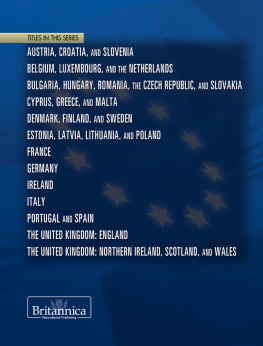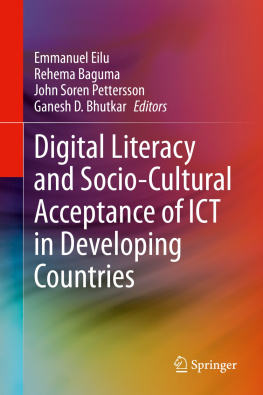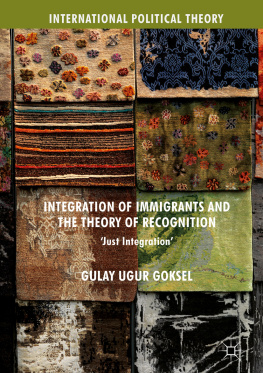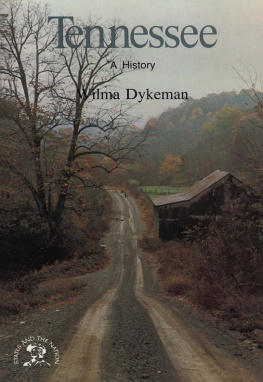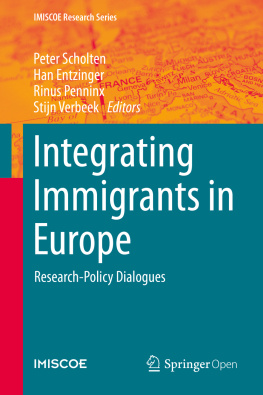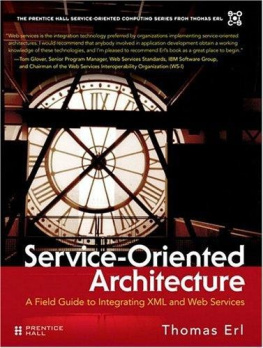First published 2003 by Ashgate Publishing
Reissued 2018 by Routledge
2 Park Square, Milton Park, Abingdon, Oxon OX14 4RN
711 Third Avenue, New York, NY 10017, USA
Routledge is an imprint of the Taylor & Francis Group, an informa business
Copyright Louk Hagendoorn, Justus Veenman and Wilma Vollebergh 2003
Louk Hagendoorn, Justus Veenman and Wilma Vollebergh have asserted their right under the Copyright, Designs and Patents Act, 1988, to be identified as the editors of this work.
All rights reserved. No part of this book may be reprinted or reproduced or utilised in any form or by any electronic, mechanical, or other means, now known or hereafter invented, including photocopying and recording, or in any information storage or retrieval system, without permission in writing from the publishers.
Notice:
Product or corporate names may be trademarks or registered trademarks, and are used only for identification and explanation without intent to infringe.
Publisher's Note
The publisher has gone to great lengths to ensure the quality of this reprint but points out that some imperfections in the original copies may be apparent.
Disclaimer
The publisher has made every effort to trace copyright holders and welcomes correspondence from those they have been unable to contact.
A Library of Congress record exists under LC control number: 2003050268
ISBN 13: 978-1-138-71637-7 (hbk)
ISBN 13: 978-1-315-19701-2 (ebk)
Contents
Introduction
Cultural Orientation and Socio-Economic Integration of Immigrants in the Netherlands
Louk Hagendoorn, Justus Veenman & Wilma Vollebergh
Philip Muus
Louk Hagendoorn & Jos Pepels
Trees Pels & Ccile Nijsten
Annerieke Oosterwegel, Wilma Vollebergh, Trees Pels & Ccile Nijsten
Maykel Verkuyten & Kadir Canatan
Karen Phalet & Iris Andriessen
Arend Od & Justus Veenman
Wilfred Uunk
Conclusion
Some Conclusions on the Integration of Immigrants in the Netherlands
Louk Hagendoorn, Justus Veenman & Wilma Vollebergh
Iris Andriessen gained her MA in Cross-Cultural Studies and Gender Studies at Utrecht University. She is currently a Ph.D. student attached to the European Research Centre on Migration and Ethnic Relations (ERCOMER). Her dissertation focuses on educational performance of minority youth in the Netherlands, with a particular emphasis on cultural values, acculturation, motivation and learning.
Kadir Canatan studied anthropology at Amsterdam University and gained his Ph.D. from Erasmus University Rotterdam. His main research interest is the political participation, self-organisation and leadership of Turkish migrants in the Netherlands. He works as an independent researcher and lives in Rotterdam.
Louk Hagendoorn is Professor of General Social Sciences at Utrecht University in the Netherlands. He was the Director of the European Research Centre on Migration and Ethnic Relations (ERCOMER) and is currently the Director of the Utrecht Graduate School of Social and Behavioral Sciences (both at Utrecht University). His research interests focus on inter-group relations, ethnic and national stereotypes, racism and discrimination, and political psychology. He has carried out research in Western and Eastern Europe on these themes. Recent books include: Hagendoorn, et al. (2001) Intergroup Relations in States of the Former Soviet Union ; Hagendoorn et al. (Eds) (2000) European Nations and Nationalism; Hagendoorn and Nekuee (Eds) (1999) Education and Racism. He has also published extensively on ethnic relations, stereotypes and nationalism in international social psychology and cross-cultural psychology journals.
Philip Muus (Ph.D. Amsterdam University) is a human geographer by training, and is currently Associate Professor of International Migration at IMER (International Migration and Ethnic Relations), Malmo University, Sweden. He has carried out numerous research projects on international migration, labour market integration of immigrants and refugee issues. He founded the Centre for Migration Research in 1991 at Amsterdam University, which merged with the European Research Centre on Migration and International Relations (ERCOMER), Utrecht University, in 1996. From 1985 to 2001 he was the Dutch SOPEMI (Continuous Reporting System on Migration) correspondent for the OECD from 1985 to 2001. He is a member of the editorial board of the Journal of Ethnic and Migration Studies (JEMS). He has carried out partly commissioned research or studies on migration and integration issues for the OECD, EU, UNHCR, Council of Europe, UN Population Division and Dutch ministries.
Ccile Nijsten studied Cultural Psychology and has worked since 1990 as a researcher at the University of Nijmegen. Her field of study is the socialisation andpsychological and religious development of minority children and adolescents in the Netherlands. At the moment she is working on her Ph.D. thesis on ethnic differences and similarities in parenting among indigenous and non-indigenous parents in the Netherlands. She is also working on a study among minority parents of delinquent adolescents in collaboration with the Institute for Sociological and Economic Research (ISEO) of the Erasmus University Rotterdam.
Arend Od studied human geography at the University of Utrecht and participated in the European Studies Programme at the University of Tilburg. While working as a research assistant at the Tinbergen Institute he lectured on the economic geography of East-Central Europe. In 1996 he completed his dissertation on international labour migration to the Netherlands and began working at the Institute for Sociological and Economic Research (ISEO), Erasmus University Rotterdam. He is currently working as a manager and researcher on population topics at Regioplan Beleidsonderzoek in Amsterdam.
Annerieke Oosterwegel gained her MA in Developmental Psychology from the University of Groningen (1986) and her Ph.D. in Social Science from the University of Amsterdam (1992). She has held lecturer and research positions in the (Developmental) Psychology Departments of the Universities of Amsterdam and Southampton and, more recently, in the Youth and Adolescent Studies Department, Utrecht University. At present, she holds a lecturership in Developmental Psychology at Utrecht University. Her research focuses on the development of self-evaluation and self-regulation, in particular in relation to wellbeing and motivation, and in the context of parent and peer relations, aggression, and acculturation. She is the author of The Self-System (1993) with L. Oppenheimer, and editor of The Self in European and North American Culture (1995) with R.A. Wicklund, and has published a number of chapters and articles in, among others, the International Journal of Behavioural Development and the Journal of Personality.


